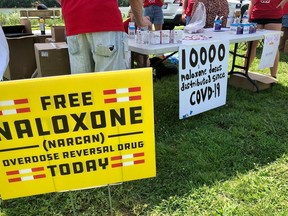
Article content
CHARLESTON, W.Va. (AP) — A federal appeals court on Tuesday overturned a landmark decision in West Virginia that had rejected attempts by an opioid-ravaged area to be compensated by U.S. drug distributors for a influx of prescription pain pills into the region.
THIS CONTENT IS RESERVED FOR SUBSCRIBERS ONLY
Subscribe now to read the latest news in your city and across Canada.
- Exclusive articles from Barbara Shecter, Joe O'Connor, Gabriel Friedman, and others.
- Daily content from Financial Times, the world's leading global business publication.
- Unlimited online access to read articles from Financial Post, National Post and 15 news sites across Canada with one account.
- National Post ePaper, an electronic replica of the print edition to view on any device, share and comment on.
- Daily puzzles, including the New York Times Crossword.
SUBSCRIBE TO UNLOCK MORE ARTICLES
Subscribe now to read the latest news in your city and across Canada.
- Exclusive articles from Barbara Shecter, Joe O'Connor, Gabriel Friedman and others.
- Daily content from Financial Times, the world's leading global business publication.
- Unlimited online access to read articles from Financial Post, National Post and 15 news sites across Canada with one account.
- National Post ePaper, an electronic replica of the print edition to view on any device, share and comment on.
- Daily puzzles, including the New York Times Crossword.
REGISTER / SIGN IN TO UNLOCK MORE ARTICLES
Create an account or sign in to continue with your reading experience.
- Access articles from across Canada with one account.
- Share your thoughts and join the conversation in the comments.
- Enjoy additional articles per month.
- Get email updates from your favourite authors.
THIS ARTICLE IS FREE TO READ REGISTER TO UNLOCK.
Create an account or sign in to continue with your reading experience.
- Access articles from across Canada with one account
- Share your thoughts and join the conversation in the comments
- Enjoy additional articles per month
- Get email updates from your favourite authors
Sign In or Create an Account
or
Article content
The 4th U.S. Circuit Court of Appeals in Richmond, Virginia, ruled that a lower court judge erred when he said West Virginia’s public nuisance law did not apply to the lawsuit involving the distribution of opioids.
Article content
Article content
Article content
“West Virginia law permits abatement of a public nuisance to include a requirement that a defendant pay money to fund efforts to eliminate the resulting harm to the public,” the 4th Circuit wrote. “West Virginia has long characterized abatement as an equitable remedy.”
Article content
By signing up you consent to receive the above newsletter from Postmedia Network Inc.
Article content
The ruling sends the case back to U.S. District Court in Charleston for “further proceedings consistent with the principles expressed in this opinion.”
Article content
Thousands of state and local governments have sued over the toll of opioids. The suits relied heavily on claims that the companies created a public nuisance by failing to monitor where the powerful prescriptions were ending up. Most of the lawsuits were settled as part of a series of nationwide deals that could be worth more than $50 billion. But there wasn’t a decisive trend in the outcomes of those that have gone to trial.
Article content
In July 2022, U.S. District Judge David Faber ruled in favor of three major U.S. drug distributors who were accused by Cabell County and the city of Huntington of causing a public health crisis by distributing 81 million pills over eight years in the county. AmerisourceBergen Drug Co., Cardinal Health Inc. and McKesson Corp. also were accused of ignoring the signs that Cabell County was being ravaged by addiction.
Article content
Article content
Faber said West Virginia’s Supreme Court had only applied public nuisance law in the context of conduct that interferes with public property or resources. He said to extend the law to cover the marketing and sale of opioids “is inconsistent with the history and traditional notions of nuisance.”
Article content
Last year the federal appeals court sent a certified question to the state Supreme Court, which states: “Under West Virginia’s common law, can conditions caused by the distribution of a controlled substance constitute a public nuisance and, if so, what are the elements of such a public nuisance claim?”
Article content
The state justices declined to answer. That 3-2 opinion in May returned the case to the federal appears court.
Article content
“We hold that West Virginia’s highest court would not exclude as a matter of law any common law claim for public nuisance caused by the distribution of a controlled substance,” the 4th Circuit wrote Tuesday. “Therefore, we necessarily conclude that the district court erred when it held that a public nuisance claim based on the distribution of opioids was per se legally insufficient under West Virginia law.”

.jpg) 3 hours ago
2
3 hours ago
2
 English (US)
English (US)